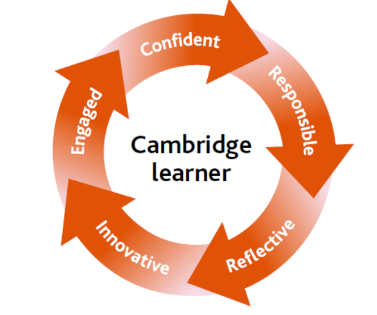IGCSE Grade 7 to 10
CAMBRIDGE INTERNATIONAL PROGRAMME AT FIS
- Cambridge International Examinations is the world’s largest provider of international education programmes and qualifications for 5 to 19 year olds. Over 10,000 schools in more than 160 countries offer Cambridge programmes and qualifications
- It is an international system of courses and examinations developed and run by the University of Cambridge, UK.
- It fosters high academic standards together with the ability to put knowledge into practice.
- It provides the basis for further study (e.g. the Advanced Subsidiary Level or the International Baccalaureate course) Cambridge International Examination prepares school students for life, helping them develop an informed curiosity and a lasting for learning. We are part of the Cambridge Assessment, a department of the University of Cambridge.
- The programmes and qualifications set the global standard for international education.

Cambridge Learner Attributes
Our Cambridge Learners are:-
- Confident in working with information and ideas their own and those of others.
- Responsible for themselves, responsive to and respectful to others.
- Reflective as learners, developing their ability to learn.
- Innovative and quipped for new and future challenges.
- Engaged intellectually and socially ready to make a difference
The CAIE curriculum at FIS
Our pathway to Cambridge
- Stage 1 – Finland Education Grades 1-6
- Stage 2 – Secondary Checkpoint grade 7 and 8
- Stage 3 -IGCSE -Grade 9 and 10
- Stage 4 – AS and AL – Grade 11 and 12.
The Students can take the Cambridge Checkpoint assessment in grade 8. These tests are available in English, Mathematics and Science which are conducted by Cambridge Assessments International Education. On completion of Cambridge Checkpoint, learners will receive a statement of achievement and detailed feedback on their progression.
Cambridge IGCSE (Grade 9 and 10)
IGCSE stands for ‘International General Certificate of Secondary Education’
- Cambridge IGCSE is the world’s most popular international qualification for 14 to 16 year olds.
- It is designed as a two year programme leading to an internationally recognized certificate
- Cambridge IGCSE is an international passport to progression, recognized by leading universities and employers worldwide as an evidence of academic ability.
- Learners develop a strong understanding of each Cambridge IGCSE subject they study, and acquire skills in creative thinking, enquiry and problem solving.
- Cambridge IGCSE builds a great foundation for further study.
- The child gets fully prepared to progress to pre-university study.
- Cambridge offers an array of courses to choose from.
- Encouraging learners to engage with a variety of subjects, and make connections between them, is fundamental to our approach.
Subjects offered for the IGCSE Programme.
All students’ quality for the IGCSE certification with a minimum of 5 subjects.
To qualify for an ICE award, a student has to choose at least 7 subjects.
They must choose 2 subjects from Group I and at least one from group II, III, IV and V.
| Subject Group | Subjects |
|---|---|
| Group 1 Languages (First Language, Second Language and Foreign Language |
|
| Group II Humanities and Social Sciences |
|
| Group III Sciences |
|
| Group IV Mathematics [Compulsory] |
|
| Group V – Professional and Creative |
|
Cambridge ICE curriculum
The Cambridge IGCSE subjects are grouped into five curriculum areas:
- Group I: Languages
- Group II: Humanities and Social Sciences
- Group III: Sciences
- Group IV: Mathematics
- Group V: Professional and Creative
Learners must take two different languages from Group I, and one subject from each of Groups II, III, IV and V. The seventh subject can be taken from any of the five subject groups.
Environmental Management (0680) can count as either a Group II or a Group III subject.The subject cannot be used to satisfy the criteria for both subject groups.
Cambridge Assessments
IGCSE uses a wide range of testing methods appropriate to different skills and subject areas.
Written papers may contain short answer questions, multiple choice questions, longer structured questions or full essays. Listening tests, speaking tests and practical tests are also used.
All of these are set by Cambridge and are sent overseas to be marked. The timetable for these exams is also set by Cambridge and as an examination centre we must adhere to their rules and regulations during the examination period. Written exams usually start in February
Core and Extended
In some subjects the examination can be taken at either of the two levels: Core or Extended. The decision as to which level is best for you will be taken by the teachers in consultation with the parents.
If you take the core paper you will be eligible for Grades C to G. If you take the extended papers you will be eligible for Grades A* to G. (up to E for Math)
The ICE Award
The International Certificate of Education (ICE) is awarded to students who take and pass at least seven subjects which form a balanced programme i.e. the programme must include English and another language, a Humanities subject, a Science subject, a Creative subject and Mathematics, i.e. at least one subject from each group.
ELIGIBILITY for IGCSE (IX and X)
Any Student who has completed Grade 8 or an equivalent course.
Admission Procedure:
For admission, students must interact with the Academic Principal and the admission office. The registration form, along with relevant documents, should be submitted to the school office after payment of registration fees.
